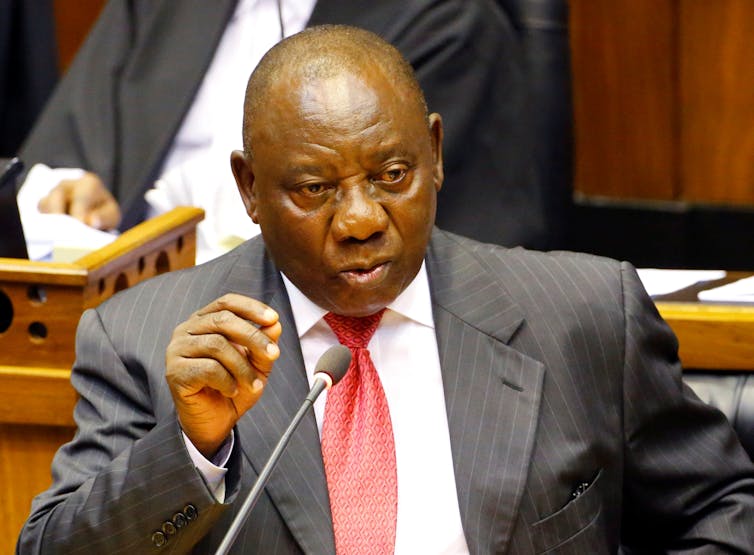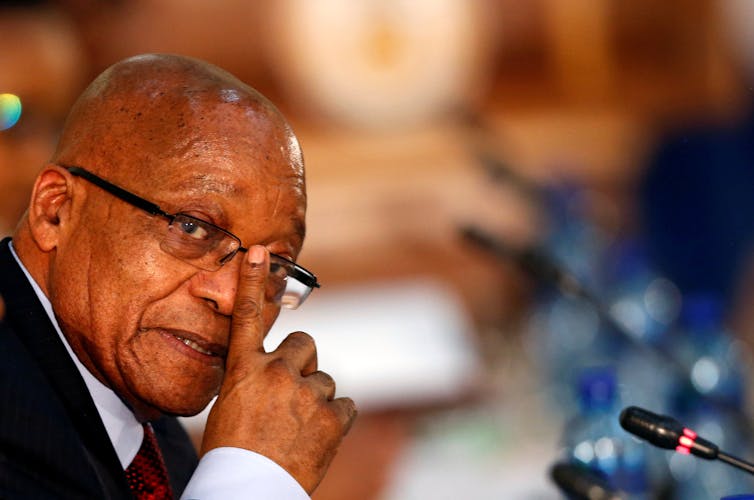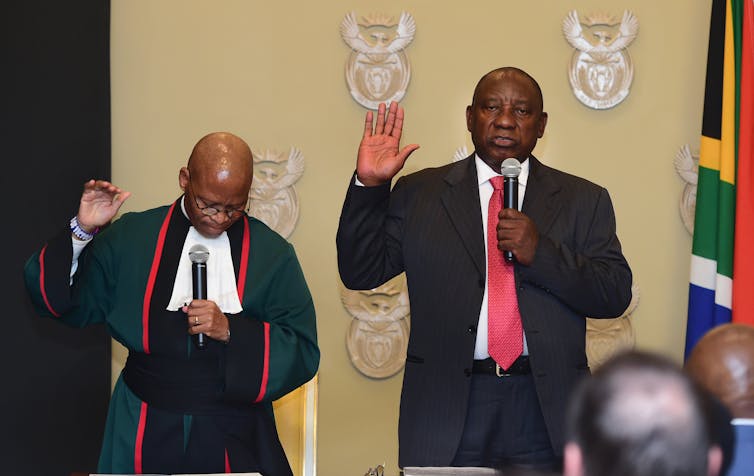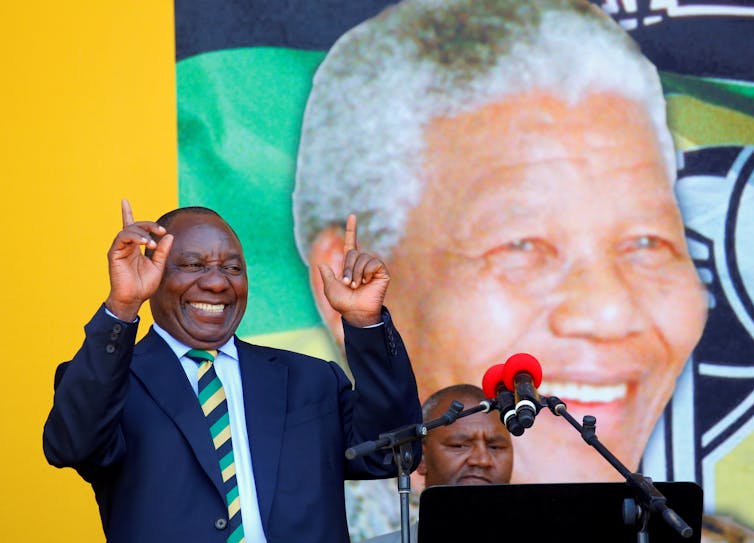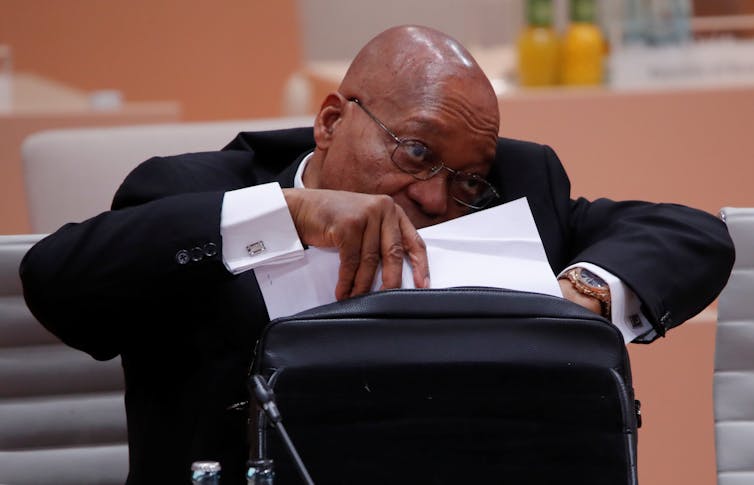
Jacob Zuma.
Wolfgang Rattay/Reuters
The flood of obituaries to the Zuma presidency are likely to stream in for some time to come. But how should the nine-year period of President Jacob Zuma’s rule be understood in its historical and theoretical contexts?
We can answer the question by applying a theoretical lens that distinguishes between state, government and ruling party as three dimensions of politics. The state is the overall machinery of power comprising different institutions and practices. It tends to persist over time even when parties, politicians and cabinets shift. Government is a formal structure of ministries and policies which may change every few years. The ruling party is an actor that plays a role in running the government, depending on circumstances.
The balance between the three dimensions is not fixed. Together they form what is often called “the regime”. This refers not only to structures, policies and practices, but also to a less tangible “ethos” that gives sense of coherence to the entire set of institutional relationships.
The post-apartheid era has seen three terms of rule, dominated by the same party, the African National Congress (ANC). For most of the post-apartheid period they were led by three very different personalities – Nelson Mandela, Thabo Mbeki and Jacob Zuma. Each was governed by a different ethos: reconciliation and nation building under Mandela, and building a technically capable state under Mbeki.
So what was Zuma’s ethos, and how does the period of his rule compare to his predecessors’?
Different eras
The primary challenge for the Mandela government was to merge different political institutions and traditions into a coherent whole while maintaining social and political stability. The ethos of reconciliation dominated. This required a reformist approach – keeping the old style of management while gradually changing personnel and policies. An orderly but gradual shift of power was needed to ensure that the volatile environment did not get in the way of a new political order being built.
This approach ensured a peaceful transition. But it was also problematic. Many senior apartheid and Bantustan bureaucrats kept their positions. Even when they were replaced, their ethos and mode of operation prevailed.
With the transition to the Mbeki period, changes in state, government and party became evident. The primary challenge shifted from ensuring stability to enhancing modernity; from racial reconciliation to technical proficiency; from creating a unified state to making it efficient.
The new imperatives were centralising planning and designing and implementing policies. The idea of the “African Renaissance” served as a unifying ethos. But it had ambiguous effects. On the one hand it presented a vision of unity and development. On the other it led to racially-inspired delusions, as was the case with Mbeki’s AIDS denialism and his support for Robert Mugabe’s regime in Zimbabwe.
The biggest problem of the Mbeki period was that its attempts at centralisation excluded voices from the margins of politics and non-state actors. In turn this undermined the quest for policy effectiveness, a failure that was to serve as the background for the Zuma period.
Man of the people
Zuma’s appeal was due precisely to his being so unlike his illustrious predecessors. Neither a giant of the struggle like Mandela nor an aloof intellectual like Mbeki. Instead, he was seen as a man of the people. Not known for grand policy visions, he was expected to be pragmatic, seeking practical solutions instead of ideological purity.
His lack of commitment to specific policies meant that he was supported by opposing factions that thought him malleable. In short, a man for – almost – all people. Even his ethical transgressions weren’t seen as obstacles. They made him more human instead.
And human, all too human, he proved to be. Dispensing with the need to offer grand visions for the state, or claim competence in government, or manage the party with impartiality, Zuma used power to advance a single goal: self enrichment. The ethos was clear: grab as much and as fast as you can.
The strategy he adopted was to mix and match individuals and structures to serve the one goal. His approach had three components which he pursued systematically. These were to control:
- parts of the state that would help shield him from accountability, in particular the criminal justice system;
- aspects of government that facilitated access to resources: minerals and energy, state-owned enterprises, ultimately the treasury; and
- party institutions to neutralise opponents, particularly those who could undermine him.
The rest he discarded. Areas of government not directly relevant to looting resources received no attention. Left to their own devices, spheres such as education, health, welfare, public safety, housing, agriculture, water, were handled with no interference from the top.
Corruption and its aftermath
Corruption on a large scale preceded Zuma and is likely continue for a long time after him. The difference is that he opened the gates for political entrepreneurs to enrich themselves by creating looting opportunities.
The impunity that guided his actions permeated all state institutions. But there was resistance: within the state the court system remained largely intact and, in many cases, fought back as did the Public Protector. Large sections of the media, NGOs, the political opposition, and principled individuals all played a role. Enclaves within government – the Treasury in particular – continued to perform their role as long as they could.
Eventually the tide turned, heralding a new transition of power in the ANC. So, what lessons can we draw from a period that saw the state subordinated to the whims of a small number of people using it to their own ends?
Ran Greenstein, Associate Professor of Sociology, University of the Witwatersrand
This article was originally published on The Conversation.
